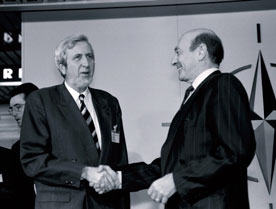North Atlantic Cooperation Council (1991-1997)
- English
- French
The North Atlantic Cooperation Council (NACC) was established by the Allies in December 1991 as a forum for dialogue and cooperation with NATO’s former Warsaw Pact adversaries. The NACC was a manifestation of the “hand of friendship” extended at the July 1990 summit meeting in London, when Allied leaders proposed a new cooperative relationship with all countries in Central and Eastern Europe in the wake of the end of the Cold War.

NATO Secretary General Manfred Wörner (right) welcomes Hungarian Foreign Minister G. Jeszenszky.
The inaugural meeting of the NACC between Allies and non-NATO countries took place on 20 December 1991. As the final communiqué was being agreed, the Soviet ambassador announced that the Soviet Union had dissolved during the meeting and that he now only represented the Russian Federation. Such was the pace of change in Europe at the time.
The next day on 21 December 1991, the Alma-Ata Protocols were signed, formally ending the USSR and establishing the Commonwealth of Independent States (CIS). The 11 former Soviet republics of the newly formed CIS were invited to participate in the NACC. Georgia and Azerbaijan joined the NACC in 1992 along with Albania, and the Central Asian republics soon followed suit.
In the immediate post-Cold War period, consultations within the NACC focused on residual Cold War security concerns, such as the withdrawal of Russian troops from the Baltic States, and on regional conflicts that were breaking out in parts of the former Soviet Union as well as in the former Yugoslavia. The NACC also opened the door to political cooperation on a number of security and defence-related issues, as well as to military-to-military contacts and cooperation.
The NACC broke new ground in many ways. The multilateral political consultation and cooperation that it encouraged helped build confidence in the early 1990s, paving the way for the launch of the Partnership for Peace (PfP) in 1994. The PfP programme offered participants the opportunity to develop practical bilateral cooperation with NATO, choosing their own priorities for cooperation.
The invitation to join the PfP programme was addressed to all states participating in the NACC and other states participating in the Conference on Security and Co-operation in Europe (which in 1995 became the Organization for Security and Co-operation in Europe).
In 1997, the Euro-Atlantic Partnership Council succeeded the NACC. This reflected the Allies’ desire to build a security forum, which would include Western European partners and be better suited for the increasingly sophisticated relationships that were being developed with partners. For instance, by then, many had been deepening their cooperation with NATO, in particular in support of defence reform and the transition towards democracy, and by actively supporting the NATO-led peacekeeping operation in Bosnia and Herzegovina.
